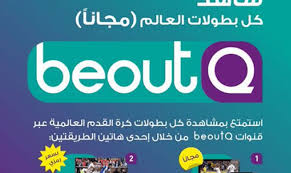By Paul Nicholson
June 21 – Saudi rogue broadcaster BeoutQ, currently under fire for stealing live pictures from Qatar-based TV network beIN Sport and NBC’s Telemundo, has also come under fire from Eleven Sports Networks for pirating its live rights.
As the Saudis have become emboldened by the lack of action against their copyright theft, so their focus has broadened beyond football to other sports rights. Eleven Sports does not hold any World Cup rights.
“This unauthorised streaming of Eleven Sports’ services seriously infringes our intellectual property rights. We are looking into this issue and we will take the appropriate course of action,” said a company statement.
Telemundo, owned by NBCUniversal, has also now issued a statement concerning the protection of its rights, saying “We take intellectual property infringement seriously.”
The company is understood to have paid $600 million for the American Spanish Language rights to the 2018 and 2022 tournaments. Infringement of its current rights by BeoutQ will undoubtedly lead NBC to demand FIFA sanctions against Saudi as well as a likely discussion on reimbursement of some of their rights fee.
FIFA, which proudly reinforced the message to its members at Congress last week that it was meeting its commercial targets, will not want the embarrassment or the difficulty of ‘money-back’ conversations with its key rights holders.
However, the commercial consequences of FIFA’s inaction for their partners are very real. According to Broadband TV News, BeIn has lost as much as 40% of its subscriber base as a result of losing the 900,000 customers it had in Saudi Arabia before the trade war with Qatar started. The World Cup rights were a key platform is supporting its subscriber base.
If the Saudis refuse to act against BeoutQ – the swiftest solution would be to pull its signal from the Arabsat satellite which is 35% owned by the Saudi government – the most obvious route open for FIFA is to make the commercial sanction against the Saudis a sporting sanction, an extreme step but FIFA needs to show it is prepared to do everything it can to protect its commercial broadcast partners and given them confidence in what they are buying is what they will get.
Commercial protection of partners has never been an issue for FIFA in the past with often criticised aggression on behalf of sponsorship and licensing partners at previous world cups in the face of ambush marketers. These kinds of protections have even extended to removing unlicensed food vendors from near stadiums.
However, with the FIFA president Gianni Infantino’s growing links to the Saudi regime and the potential $25 billion of new money for his new global calendar proposals, FIFA seems reluctant to act with the incisiveness seen under previous regimes.
The sacrifice of a few commercial broadcast partners, it seems, could be the price the world governing body is prepared to pay. The message that sends to rest of the commercial rights business, though, will be not be missed or misunderstood.
See FIFA in the spotlight as defiant beoutQ pirates World Cup signals from NBC and beIN
Contact the writer of this story at moc.l1745267597labto1745267597ofdlr1745267597owedi1745267597sni@n1745267597osloh1745267597cin.l1745267597uap1745267597

